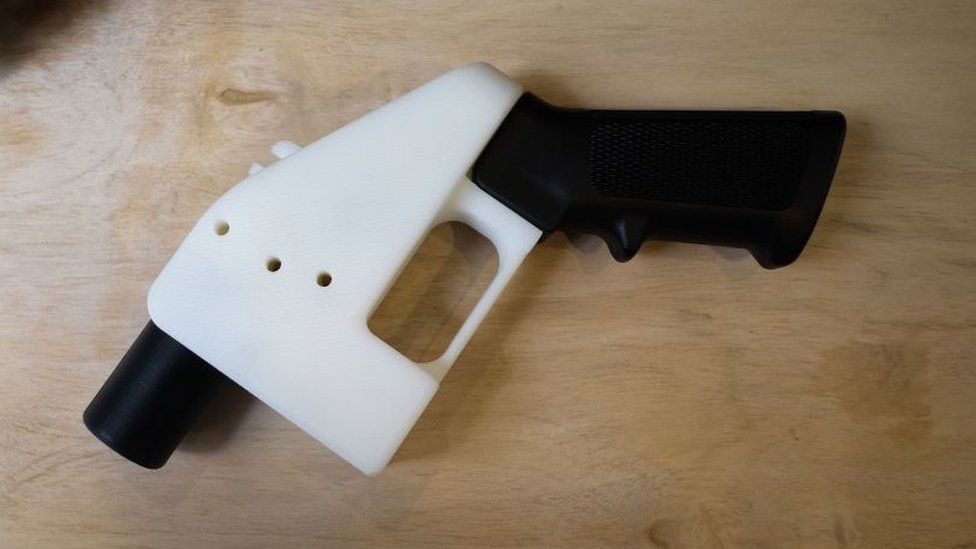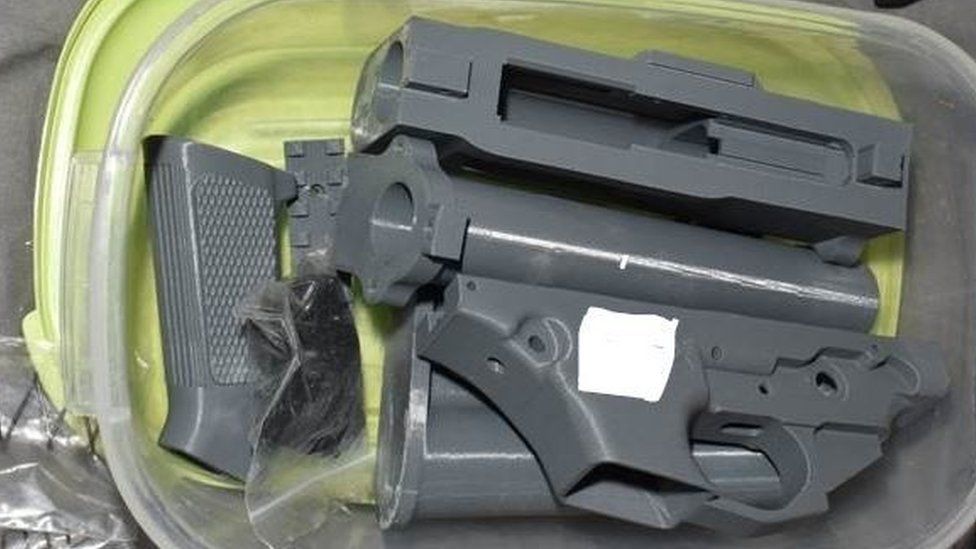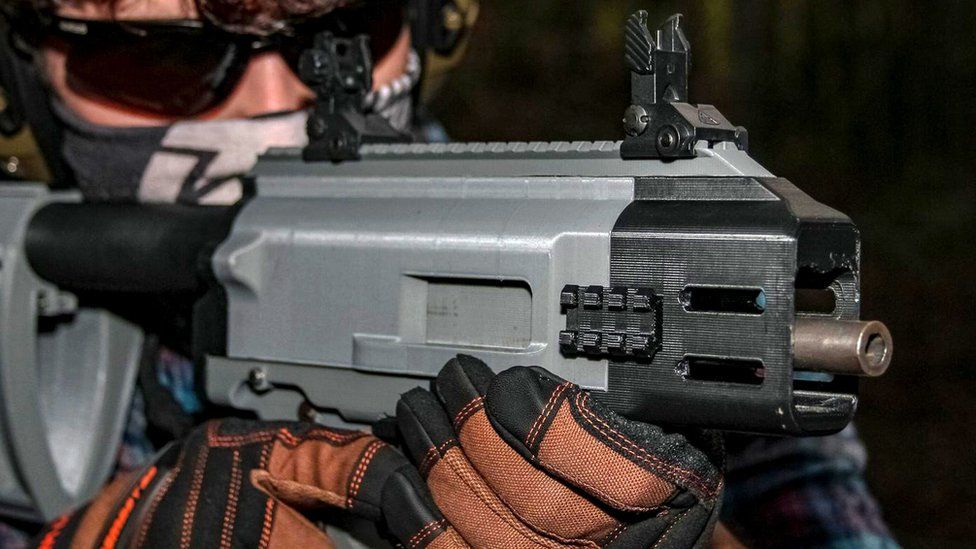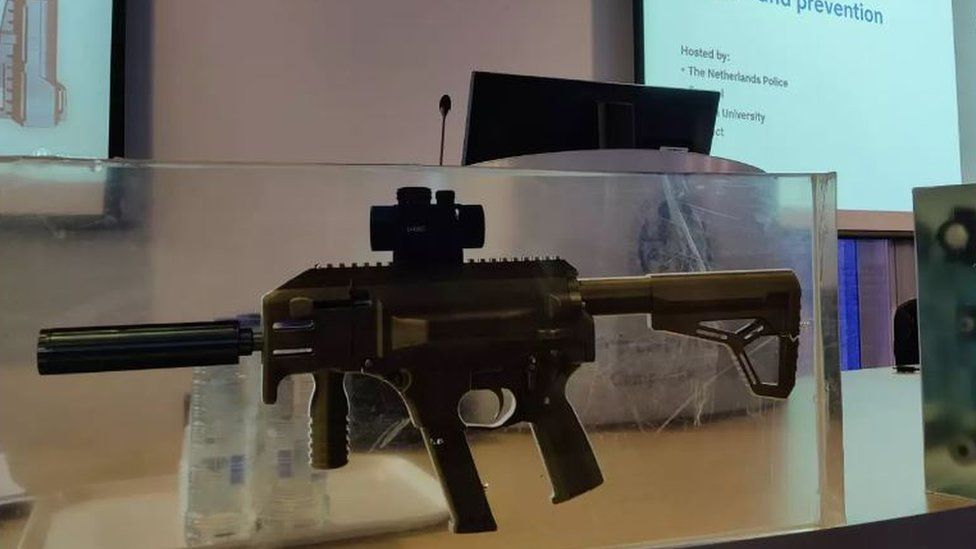3D printed guns: Warnings over growing threat of 3D firearms

Last month police said they made one of the largest seizures of 3D printed firearm components in the UK.
Officers from the Metropolitan Police’s Specialist Crime Command had discovered what they alleged was a “suspected makeshift 3D firearms factory” at a home in London on 7 October.
Officers said it demonstrated how “the emerging threat of 3D firearms continues to evolve”.
The discovery comes as some experts also warn of a growing threat.
Early versions of 3D printed guns were unreliable, single-shot weapons. Now the National Crime Agency (NCA) tells the BBC the guns are “credible and viable”.
The NCA’s Matthew Perfect, head of the the National Firearms Targeting Centre, says the latest 3D weapons are “stuff that you definitely, definitely wouldn’t want to see on the streets in the UK”.
“These are automatic weapons. These are weapons that are capable of multiple rounds of discharge,” he said.
At present, the 3D printed components only form some of the parts needed to make a gun, at most 80 to 90% of the weapon, Mr Perfect says.
Key metal components such as the barrel typically have to be manufactured in more traditional ways. And the guns still require ammunition.
As a consequence Mr Perfect is confident the guns can still be detected by “normal security processes”.

But these firearms are hard to trace as they are made without serial numbers.
Police are seizing 3D printed weapons in greater numbers. From the start of last year there have been 21 recoveries of weapons, a “significant increase” on previous years, though still small compared to conventional weapons, Mr Perfect says.
Difficulties in transporting weapons across borders during the Coronavirus pandemic may have contributed criminals’ interest in printed guns, he suggests.
Peter Squires, professor of criminology and public policy at the University of Brighton, said the threat was likely to grow.
“Things have moved quite fast,” he told the BBC, adding the pace is only a little over expectations.
“I’d certainly anticipate more of this, the technology is out there … and the software and designs are available on the web.”
And even if some of the “plastic-type” guns he says remain relatively unreliable, they still have the power to intimidate; guns, he notes, are only fired in about 20% of gun crimes.

Rajan Basra, senior research fellow at the International Centre for the Study of Radicalisation at King’s College London, says the situation in the UK mirrors a trend visible around Europe.
While most violent extremists will prefer established weapons, printed guns are an alternative for those who can’t obtain illicit firearms.
“We’ve seen a steady succession of extremists looking to either make 3D printed guns or even use them themselves,” he said.
“We’ve seen cases in Spain, Sweden, Germany, in the Netherlands, and several here in in the UK.”
He said the clear majority of these cases involved members of far-right groups. Other terrorists groups seem less interested in the technology.
In part, Dr Basra suggests, that is because discussions on far-right extremist forums and communities sometimes included instructions on how to produce 3D printed weapons.
In June, members of an extreme right-wing terror group were convicted at Sheffield Crown Court. It was revealed police had found a partially constructed 3D printed firearm in the home of two members of the group.
Dr Basra warns the weapons are “moving into the mainstream” and on to mainstream internet platforms.
The emergence of new automatic weapons much more powerful than early single-shot designs has also increased their attractiveness.
Among extremists, he said, experts saw recurrent references to one semi-automatic model, the FGC – the name is an acronym expressing, in strong language, opposition to gun control.
“It’s a specific gun that was designed to be used with parts that aren’t regulated in the EU,” Dr Basra said.
The weapon was posted online in spring 2020 with step-by-step instructions. It comes with a 64-page manual, and videos on how to go through each step of the process of manufacture, Dr Basra added.
Mr Perfect, from the NCA, says modified versions of the gun can be “as good as any automatic firearm that you would buy from a reliable manufacturer”.

But police are keen to stress that gun violence in the UK is still relatively uncommon – about 35 homicides a year Mr Perfect estimates.
And use of an automatic weapon would attract a lot of police attention. But criminals want these weapons to intimidate other criminals.
For that they need a credible weapon, and 3D guns are now earning that credibility, due to better designs, and better printing technology – technology that is changing and improving all the time.
Evolving technologies
Christian Goblas, a ballistics expert at France’s University of Rouen, recently told Euractiv “3D metallic printing” could become affordable in the next decade, which could make self-made weapons more durable and reliable.
And Europol told the BBC that national authorities within the EU have uncovered a number of cases of the production, sale and possession of 3D printed weapons and parts.
Some of the weapons and components were offered on illicit dark web marketplaces, which Europol said showed the synergies between the firearms trade and cybercrime.
The organisation noted that while producing a complete 3D printed firearm was still challenging “rapidly evolving advanced technology may cause this to emerge as a more significant threat in the near future.”
But Dr Basra warns of another risk. Terrorists have a history of copying methods that have previously been shown to be effective. He said there was a rise in terror attacks where a vehicle was driven into crowds after the 2016 Nice attack.
He says if 3D printed weapons are used in an attack that causes mass casualties, that would in turn send a message that “3D printed guns are viable, and they’re effective”.
